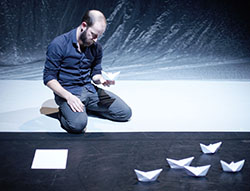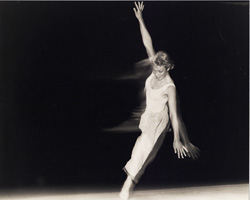The two works that made up this program — James, performed by James Gnam (plastic orchid factory) and Cible de Dieu/Target of God, performed by Jacques Poulin-Denis (Grand-Poney) — are strong solos on their own, but as a double bill, they more than double the pleasure.
Both works are built around a spoken-word narrative, which tells the story of each man’s life experience of failure or defeat; Gnam in a subdued, literary voice, Poulin-Denis in a charismatic, humorous voice.
I saw the premiere of James here back in 2010, and enjoyed it even more this second time. Co-created by Gnam and Vancouver’s Lee Su-Feh, James traces the history of Gnam’s twenty-seven years of performing the Nutcracker ballet. From the beginning, when Gnam casually sits down at backstage centre, pulling on his socks, he establishes a sense of intimacy, as though he were narrating his story to each audience member one-to-one. His capacity to act as storyteller and simultaneously dance with a relaxed movement dynamic is so integrated it could well be taken for granted.
Gnam and Lee effectively withhold the heroic ballet vocabulary until the conclusion of the work, offering short recalls of Gnam’s ballet life in the first half: unbearably light, big skips that reference childhood Nutcracker rehearsals; and grand fouetté en tournant jumps with beats, which establish Gnam’s adult Nutcracker identity.
The majority of the movement is more subtle, almost explorative in nature, contemporary variations on classical pliés and port de bras that illustrate energy rippling through the pathways of the body, fingers curling sequentially, spine curving forward, hip and pelvis weighted to one side, defying symmetry.
The work builds to a story about Gnam’s role as the Prince in a Nutcracker performance with a semi-professional group of dancers, and his fall out of the spectacular tour en l’air, a big jump from a standing position with a full rotation of the body in the air, ending on one knee. Gnam performs double turns in the air before purposely falling on the floor at the end of each attempt. He narrates the memory like a vivid, post-trauma flashback, almost stoically; repeating the turn and the fall many times, the way the mind replays obsessive images.
Jacques Poulin-Denis, actor, dancer, composer and comedian, bridges the space between performer and audience in minutes, persuading the house to hum the melody of Beethoven’s Für Elise, presumably because his CD fails to play. Poulin-Denis deftly links to Gnam’s work, pleading, “James can’t you fix the CD for me?” and apologizing to the audience, explaining this sort of thing “rarely happens.” Cible de Dieu, also structured around a continuous narrative, begins with Poulin-Denis claiming that he trains with a circus performer in Montreal and wants to demonstrate one of his new tricks, balancing an umbrella on his chin. Add the theme of disaster to this set-up and you have fifty minutes of brilliant theatrical dance comedy.
There is a splendid moment when Jacques is splayed across the stage floor, remnants of props strewn in all directions, the smashed umbrella and the fallen chair, as well as his prosthetic leg and foot. That’s right — during one “failed” attempt to perform a handstand on a plastic chair Poulin-Denis disarms the audience, losing and tossing his prosthetic lower leg across the stage in frustration. James Proudfoot strikes the perfect mood, darkening the lights in this scene, as though a tornado has just ripped through Poulin-Denis’s life. Proudfoot’s lighting effect between scenes is also provocative: a brilliant white flash momentarily blinds the audience, a signal of catastrophes to come.
After revealing and abandoning his prosthetic, Poulin-Denis covers the whole stage on one foot, a whirlwind of movement, hopping, careening, taking forward falls into the floor on his thigh, his hip, and turning backward somersaults that slam into the floor, only to rise again and carry on.
It seems impossible that things could get worse — but a skilful actor and storyteller, Poulin-Denis has the ability to narrate even more disappointment, extending the plot line of cosmic bad luck to outlandish proportions. He becomes still, telling us that he was recently diagnosed with a brain tumour. How is it that we erupt into laughter? Poulin-Denis stares back in shock, arousing a tinge of guilt, matching the awkward laughs.
Poulin-Denis also employs an acting strategy by which he abruptly “forgets” the next words or ideas in his sentence, freezing in perplexed silence, which like a magnet takes us with him into the void, and a deeper experience of self.
Cible de Dieu is theatrical and physical comedy that gets very close to the feeling of screwing up in life or being the victim of terrible fortune. James is more about the body, itself, in and out of balance; Gnam breaks down the tours en l’air slowly at one point, so we can observe the misalignment in his body that results in the fall. As much as I enjoyed both works, Cible de Dieu presented more thought-provoking theatre; however, together these two works make a powerful statement about the nature of failure in our lives, leaving us with the realization that failure and defeat, nearly taboo in our society, are indispensible to being human.
The combined program, unique to the Firehall Arts Centre, can also be viewed as a commentary on masculinity and social norms that pressure men to be “winners,” not “losers,” emotionally restrained and always pushing their bodies beyond natural limits.
Tagged: Choreography, Contemporary, Performance, BC , Vancouver





